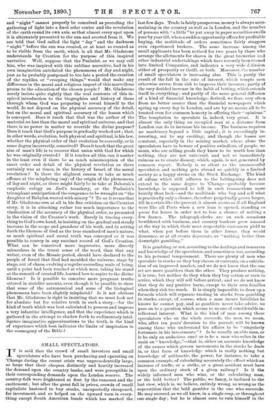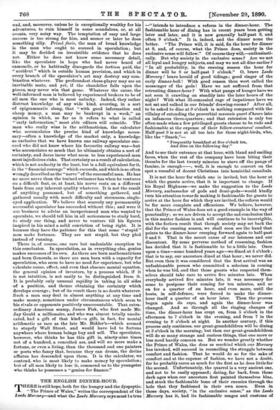SMALL SPECULATORS.
IT is said that the crowd of small investors and small speculators who have been purchasing and operating on !Change during the recent crisis was nnprecedentedly large, so large that their cheques distinctly and heavily increased the demand upon the country banks, and were perceptible in their corresponding demands upon the London reserve. The country-folk were frightened at first by the rumours and the excitement; but after the great fall in prices, crowds of small capitalists hastened to buy stocks, unexpectedly cheapened, for investment, and so helped on the upward turn in every- thing except South American bonds which has marked the last few days. Trade is fairly prosperous, money is always accu- mulating in the country as well as in London, and the number of persons with "a little "to put away in paper securities swells year by year till, when a sudden opportunity offers for profitable buying, the multitude of orders sometimes fairly staggers even experienced brokers. The same increase among the small applicants has been noticed for two years by those who arrange the allotments for shares in the great breweries and other industrial undertakings which have recently been turned into limited Companies, and indicates a very wide diffusion either of prosperity or thrift, or both. Moreover, the number of small speculators is increasing also. This is partly the result of the fall in the rate of interest, which tempts men otherwise averse from risk to improve their incomes; partly of the very decided increase in the habit of betting, which extends itself to everything ; and partly of the more general diffusion of a kind of financial knowledge, derived, we fear, very often from no better source than the financial newspapers which spring up every day in London, and are by no means all to be trusted even for common honesty in offering their "opinions." The temptation to speculate is, indeed, very great. It is almost the only thing an occupied man at a distance from London can do to increase his income. The business requires no machinery beyond a little capital ; it is exceedingly in- teresting, not to say exciting; and though the losses are constant, especially in the mining market, where alone the speculators have to beware of positive swindlers, of people, we mean, who are selling goods they know to be worth less than nothing, they are not universal, and not so immediately ruinous as to create dismay, which, again, is not generated by common report. Nobody is so silent as the unsuccessful speculator, and nothing gets abroad so quickly in a limited society as a happy stroke on the Stock Exchange. The kind of odium which still adheres to the betting-ring does not extend in the same degree to 'Change—probably because knowledge is supposed to tell in such transactions more heavily than luck—and the multitude who buy and sell what is practically only a chance, therefore perpetually grows larger, till in a crisis like the present, it almost seems as if all England were like all Paris when a new loan is opened, standing en queue for hours in order not to lose a chance of netting a few francs. The telegraph-clerks are on such occasions bewildered with business, and country bankers grow amazed at the way in which their most respectable customers yield to what, when put before them in other forms, they would denounce, or at all events deprecate, as "nothing better than downright gambling."
It is gambling or not, according to the dealings and resources and knowledge of the speculator, and sometimes, too, according to his personal temperament. There are plenty of men who speculate in stocks as they buy cheese or currants, on a calcula- tion of an improved market, and we do not know that the one set are more gamblers than the other. They produce nothing, it is true, but neither do they when they buy cotton or corn to arrive, which they will sell before arrival; and we do not know that they do any positive harm, except to their own families when they risk too much. It is simply impossible to draw up a formula which will separate trading in stocks from gambling in stocks, except, of course, when a man incurs liabilities he knows he cannot pay, and as gamblers never take advice, we pass on to a question which seems to us one of considerable in- tellectual interest. What is the kind of man among these speculators who on the whole succeeds, the man, we mean, who, after ten years' devotion to the pursuit, will be known among those who understand his affairs to be "singularly fortunate in his investments"? Is he usually an able man, or is he only an audacious one? or is he a man who relies in the main on "knowledge,"—that is, either on accurate knowledge of the causes which govern movements in the stocks he deals in, or that form of knowledge which is really nothing but knowledge of arithmetic, the power, for instance, to take a common example, of calculating accurately the effect which an increase of traffic, or a strike, or a great accident must have upon the ordinary stock of a given railway? Is it the widely informed man who wins, or the calculating man, or the bold bettor? The public, we fancy, is inclined to the last view, which is, we believe, entirely wrong, as wrong as the superstition that the bold gambler is the one who succeeds. He may succeed, as we all know, in a single coup, or throughout one single day ; but he is almost sure to ruin himself in The end, and, moreover, unless he is exceptionally wealthy for his adventures, to ruin himself in some scandalous, or, at all -events, very noisy way. The temptation of easy and large :success is too strong for him, and sooner or later he does something silly. Prina facie, the man of broad knowledge is the man who ought to succeed in speculation ; but it may be decided on irresistible evidence that he does not. Either he does not know some necessary detail, like the speculator in hops who had never heard of camomile, or he habitually disregards the tertium quid, the accident" which is outside human prevision, and which in every branch of the speculator's art may destroy any com- bination whatever. The profoundest chess-player may see an inevitable mate, and yet, if the chandelier falls upon the pieces, may never win that game. Whatever the cause, the well-informed man is believed by experienced brokers to be of all men the one who is most unlucky. Indeed, they rather distrust knowledge of any wide kind, averring, in a sort of epigrammatic slang, that "with good information and cheap money, a man may be bankrupt in a week," an opinion in which, so far as it refers to what is called "early information," most able editors will coincide. The man who really wins is the arithmetician, the calculator who accumulates the precise kind of knowledge neces- sary—often a knowledge of the market only, a knowledge so exclusive that we have known one railway speculator suc- ceed who did not know where his favourite railway was—but who accumulates so much that he ultimately obtains a sort of certainty, and dares incur what seem to less experienced men most injudicious risks. That certainty as a result of calculation, which is not audacity in the least, but is a fall equivalent for it, is the "financial courage" which succeeds, and which is so often wrongly described as the "nerve" of the successful man. He has no more nerve than the trained swimmer has when he ventures on a difficult feat, or, at least, his nerve rests on a different basis from any inherent quality whatever. It is not the result a anything possessed, but of something gathered, and gathered usually with much difficulty and strenuous, single- eyed application. We believe that scarcely any permanently successful speculator has succeeded without this ; and were it our business to advise an inexperienced man who wanted to speculate, we should tell him in all seriousness to study hard, to study one thing, and never to venture till his figures inspired in his mind a solid conviction of being right. It is because they have the patience for this that some "stupid" men make fortunes. They are not stupid, but they plod instead of running.
There is, of course, one rare but undeniable exception to this conclusion. In speculation, as in everything else, genius snakes successes of its own. As there are born mathematicians and born Generals, so there are men born with a capacity for speculation, who seem to have no need for experience, but who calculate cause, effect, and even that obscure mental equation, the general opinion of investors, by a process which, if it is not intuition, is not easily to be distinguished from it. It is probably only unusual rapidity in taking in all sides of a position, and thence obtaining the certainty which develops courage ; but of its result there is no doubt whatever. Such a man may deal in almost anything at any time and make money, sometimes under circumstances which seem to 'his rivals or opponents positively unaccountable. That extra- ordinary American scamp, James Fisk, who first made Mr. Jay Gould a millionaire, and who was almost totally unedu- cated, had a gift of that kind—a gift, in fact, for mental arithmetic as rare as the late Mr. Bidder's—which seemed to stupefy Wall Street, and would have led to fortune anywhere where human beings buy and sell. The speculator, however, who thinks he has this gift is, ninety-nine times out of a hundred, a conceited ass, and will no more make a fortune, or even a living, than the thousand and one painters or poets who fancy that, because they can dream, the divine afflatus has descended upon them. It is the calculator, we contend, who is most likely to make money by speculation ; but of all men likely to lose it, commend us to the youngster who thinks he possesses a "genius for finance."











































 Previous page
Previous page